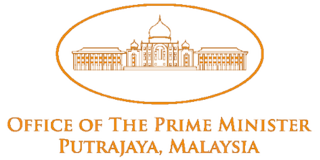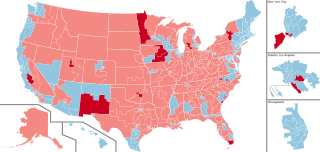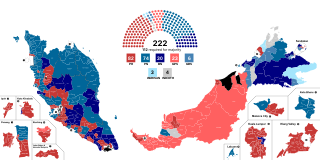 |
|---|
| Administrative divisions (Quarters) |
General elections were held in Saint Lucia on 25 April 1969. [1] The result was a victory for the United Workers Party, which won six of the ten seats. Voter turnout was 53.9%.
 |
|---|
| Administrative divisions (Quarters) |
General elections were held in Saint Lucia on 25 April 1969. [1] The result was a victory for the United Workers Party, which won six of the ten seats. Voter turnout was 53.9%.
| Party | Votes | % | Seats | +/– | |
|---|---|---|---|---|---|
| United Workers Party | 13,606 | 58.60 | 6 | 0 | |
| Saint Lucia Labour Party | 8,270 | 35.62 | 3 | +1 | |
| SLP–United Front | 1,342 | 5.78 | 1 | New | |
| Total | 23,218 | 100.00 | 10 | 0 | |
| Valid votes | 23,218 | 96.07 | |||
| Invalid/blank votes | 950 | 3.93 | |||
| Total votes | 24,168 | 100.00 | |||
| Registered voters/turnout | 44,868 | 53.86 | |||
| Source: Caribbean Elections | |||||

An election is a formal group decision-making process by which a population chooses an individual or multiple individuals to hold public office.

The Republican Party, also referred to as the GOP, is one of the two major contemporary political parties in the United States. The GOP was founded in 1854 by anti-slavery activists who opposed the Kansas–Nebraska Act, which allowed for the potential expansion of chattel slavery into the western territories. Since Ronald Reagan's presidency in the 1980s, conservatism has been the dominant ideology of the GOP. It has been the main political rival of the Democratic Party since the mid-1850s.

The National Front is a political coalition of Malaysia that was founded in 1973 as a coalition of right-wing political parties. It is also the third largest political coalition with 30 seats in the Dewan Rakyat after coalition Pakatan Harapan with 82 seats and the coalition Perikatan Nasional with 73 seats.

The Bharatiya Janata Party is a political party in India, and one of the two major Indian political parties alongside the Indian National Congress. Since 2014, it has been the ruling political party in India under Narendra Modi, the incumbent Indian prime minister. The BJP is aligned with right-wing politics, and its policies have historically reflected a traditional Hindu nationalist ideology; it has close ideological and organisational links to the Rashtriya Swayamsevak Sangh (RSS). As of 17 February 2022, it is the country's largest political party in terms of representation in the Parliament of India as well as state legislatures.

The Indian National Congress (INC), colloquially the Congress Party but often simply the Congress, is a political party in India with widespread roots. Founded in 1885, it was the first modern nationalist movement to emerge in the British Empire in Asia and Africa. From the late 19th century, and especially after 1920, under the leadership of Mahatma Gandhi, the Congress became the principal leader of the Indian independence movement. The Congress led India to independence from the United Kingdom, and significantly influenced other anti-colonial nationalist movements in the British Empire.
The incumbent is the current holder of an office or position, usually in relation to an election. For example, in an election for president, the incumbent is the person holding or acting in the office of president before the election, whether seeking re-election or not. In some situations, there may not be an incumbent at time of an election for that office or position, in which case the office or position is regarded as vacant or open. In the United States, an election without an incumbent is referred to as an open seat or open contest.

The 2008 United States presidential election was the 56th quadrennial presidential election, held on Tuesday, November 4, 2008. The Democratic ticket of Barack Obama, the junior senator from Illinois, and Joe Biden, the senior senator from Delaware, defeated the Republican ticket of John McCain, the senior senator from Arizona, and Sarah Palin, the governor of Alaska. Obama became the first African American to be elected to the presidency, as well as being only the third sitting United States senator elected president, joining Warren G. Harding and John F. Kennedy. Meanwhile, Biden became the first senator running mate of a senator elected president since Lyndon B. Johnson in the 1960 election.

The prime minister of Malaysia is the head of government of Malaysia. The prime minister directs the executive branch of the federal government. The Yang di-Pertuan Agong appoints as the prime minister a member of Parliament (MP) who, in his opinion, is most likely to command the confidence of a majority of MPs; this person is usually the leader of the party winning the most seats in a general election.
An independent or non-partisan politician is a politician not affiliated with any political party or bureaucratic association. There are numerous reasons why someone may stand for office as an independent.

The 2012 United States presidential election was the 57th quadrennial presidential election, held on Tuesday, November 6, 2012. Incumbent Democratic President Barack Obama and his running mate, incumbent Vice President Joe Biden, were re-elected to a second term. They defeated the Republican ticket of businessman and former Governor Mitt Romney of Massachusetts and Representative Paul Ryan of Wisconsin.

The 2016 United States presidential election was the 58th quadrennial presidential election, held on Tuesday, November 8, 2016. The Republican ticket of businessman Donald Trump and Indiana governor Mike Pence defeated the Democratic ticket of former secretary of state and First Lady of the United States Hillary Clinton and the United States senator from Virginia Tim Kaine, in what was considered one of the greatest upsets in American history. Trump took office as the 45th president, and Pence as the 48th vice president, on January 20, 2017. It was the fifth and most recent presidential election in which the winning candidate lost the popular vote. It was also the sixth presidential election, and the first since 1944, in which both major party candidates were registered in the same home state.

The Election Commission of India (ECI) is a constitutional body. It was established by the Constitution of India to conduct and regulate elections in the country. Article 324 of the Constitution provides that the power of superintendence, direction, and control of elections to parliament, state legislatures, the office of the president of India, and the office of vice-president of India shall be vested in the election commission. Thus, the Election Commission is an all-India body in the sense that it is common to both the Central government and the state governments.

The 2020 United States presidential election was the 59th quadrennial presidential election, held on Tuesday, November 3, 2020. The Democratic ticket of former vice president Joe Biden and the junior U.S. senator from California Kamala Harris defeated the incumbent Republican president Donald Trump and incumbent vice president Mike Pence. The election took place against the backdrop of the global COVID-19 pandemic and related recession. It was the first election since 1992 in which the incumbent president failed to win a second term. The election saw the highest voter turnout by percentage since 1900, with each of the two main tickets receiving more than 74 million votes, surpassing Barack Obama's record of 69.5 million votes from 2008. Biden received more than 81 million votes, the most votes ever cast for a candidate in a U.S. presidential election.

The 2022 United States Senate elections were held on November 8, 2022, concurrently with the 2022 midterm elections at the federal, state, and local level, including elections to the U.S. House of Representatives. Elections were held for 35 of the 100 seats in the U.S. Senate, the winners of which will serve six-year terms in the U.S. Congress from January 3, 2023, to January 3, 2029. Although the Republican Party was favored according to pundits, the Democratic Party pulled an upset victory and retained their majority in the Senate, which they held since 2021.

The 2022 United States elections were held on November 8, 2022, with the exception of absentee balloting. During this U.S. midterm election, which occurred during the term of incumbent president Joe Biden of the Democratic Party, all 435 seats in the U.S. House of Representatives and 35 of the 100 seats in the U.S. Senate were contested to determine the 118th United States Congress. Thirty-nine state and territorial U.S. gubernatorial elections, as well as numerous state and local elections, were also contested. This was the first election affected by the 2022 U.S. redistricting that followed the 2020 U.S. census. The Republican Party won the House by a narrow majority, and Democrats retained control of the Senate.

The 2020 United States House of Representatives elections were held on November 3, 2020, to elect representatives from all 435 congressional districts across each of the 50 U.S. states, as well as six non-voting delegates from the District of Columbia and the inhabited U.S. territories. Special House elections were also held on various dates throughout 2020.

The 2022 United States House of Representatives elections were held on November 8, 2022, as part of the 2022 U.S. elections during incumbent president Joe Biden's term. The Republican Party won a majority of seats and will be the majority party in the House in the 118th U.S. Congress. The elections were held to elect representatives from all 435 U.S. congressional districts across each of the 50 states, as well as five non-voting members of the U.S. House of Representatives from the District of Columbia and four of the five inhabited insular areas. Numerous other federal, state, and local elections, including the 2022 U.S. Senate elections, were also held on the same date. At the time of the election, the Democratic Party had held a majority in the House since January 3, 2019, as a result of the 2018 elections, when they won 235 seats; their majority was reduced to 222 seats in 2020.

The 2022 Malaysian general election, formally the 15th Malaysian general election (GE15), was held on Saturday, 19 November 2022, to elect the 222 members of the Dewan Rakyat in the 15th Parliament of Malaysia.

The 2024 United States Senate elections are scheduled to be held on November 5, 2024, as part of the 2024 United States elections. 33 of the 100 seats in the U.S. Senate will be contested in regular elections, the winners of which will serve six-year terms in the U.S. Congress from January 3, 2025, to January 3, 2031. Senators are divided into three groups, or classes, whose terms are staggered so that a different class is elected every two years. Class 1 senators were last elected in 2018, and will be up for election again in 2024. Numerous other federal, state, and local elections, including the U.S. presidential election and elections to the House, will also be held on this date.

The 2024 United States presidential election will be the 60th quadrennial presidential election, scheduled for Tuesday, November 5, 2024. It will be the first presidential election after electoral votes are redistributed according to the post-2020 census reapportionment. Incumbent president Joe Biden stated in January 2022 his intent to run for reelection to a second term, with Vice President Kamala Harris as his running mate. As of November 2022, Biden has not yet committed to a reelection campaign. After repeatedly suggesting he would run, former president Donald Trump announced his candidacy for president for a second nonconsecutive term on November 15, 2022.